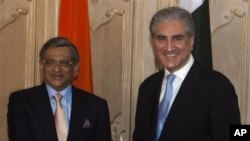Pakistan and India have agreed to resume their wide-ranging peace dialogue that New Delhi suspended shortly after the 2008 terror attacks in Mumbai.
A statement issued simultaneously in Islamabad and New Delhi says that the rival nuclear-armed countries "have agreed to resume dialogue on all issues."
Senior Indian and Pakistani officials will hold a series of talks on counter-terrorism, humanitarian problems, the disputed Kashmir region, peace and security, and other border issues.
The statement says that Pakistani foreign minister Shah Mehmood Qureshi will travel to New Delhi by July to meet with his Indian counterpart and review progress in these talks.
The decision to return to the negotiating table was made last Sunday in Bhutan, where the foreign secretaries of India and Pakistan met on the sidelines of a regional conference.
Speaking to reporters in Islamabad, Pakistani Prime Minister Yousuf Raza Gilani welcomed the talks and praised his Indian counterpart Manmohan Singh for the "opening of a new chapter" in bilateral relations.
The Pakistani prime minister expressed satisfaction with the decision, saying it constitutes the culmination of the efforts he and his Indian counterpart, Manmohan Singh, have made since they first met in Bhutan in April 2010.
The United States has been pressing India and Pakistan to restart peace efforts to reduce regional tensions. Ayesha Saeed of the NUST Business School in Islamabad says a combination of internal and external pressures may have pushed the two rival nations to resume the dialogue.
"I believe there would have been some international pressure that has been exerted on both sides," said Saeed. "But I think both sides have also realized that the process has remained frozen for way too long and that will undo all the good work that the two countries did since 2004."
Analyst Ayesha Saeed recently conducted research on the impact of the trade that India and Pakistan launched across the disputed border in Kashmir nearly three years ago.
India suspended the nearly five-year-old wide-ranging peace process after blaming Pakistan-based Islamic militants for the November 2008 commando-style raids in Mumbai. Indian officials say at least 166 people were killed in the attacks.
"The two countries have to work very hard to make sure that the composite dialogue process does not derail again in case of another unfortunate event [like the Mumbai attacks]," added Saeed. "They need to open up their communication channels and they need to work consistently to proactively reduce the trust deficit that exists between the two countries."
New Delhi has long wanted Pakistan to investigate and try those responsible for the Mumbai attacks before it restores the dialogue. The Pakistani government denies allegations that any of its state security agencies was involved in the attacks.
Pakistani authorities have detained seven suspected militants for playing a role in the Mumbai carnage. But Islamabad insists its anti-terrorism court needs more evidence from Indian investigators to proceed with the trial.




